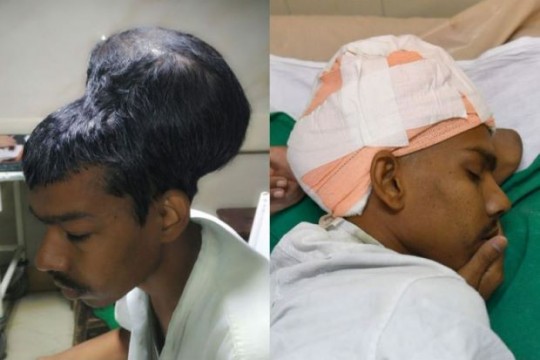Search the Community
Showing results for tags 'brain'.
-
https://www.straitstimes.com/asia/east-asia/south-korea-reports-first-death-from-brain-eating-amoeba SEOUL - South Korea reported its first case of infection from Naegleria fowleri, commonly referred to as “brain-eating amoeba”, health authorities said on Monday. The Korea Disease Control...
-
Girls vs. Boys: Brain Differences Might Explain Tech Behaviors By Julie Jargon https://www.wsj.com/articles/girls-vs-boys-brain-differences-might-explain-tech-behaviors-11569317402?shareToken=stf11a3d13d7ef4c92a3a25ed4a6e2867e&mod=djmc_pkt_evgrn Recent research shows the brain’s rewar...
-
The Straits Times was granted exclusive access to document an awake surgery, where doctors removed a brain tumour from patient Oh Zhi Long while he was still conscious. Mr Oh Zhi Long, 32, discovered by accident that he had a brain tumour. Less than a week later, he lay awake in the operating th...
- 14 replies
-
- 4
-

-
- tumor
- brain surgery
- (and 5 more)
-
Indian surgeons remove 'heaviest recorded' brain tumour Feb 23, 2018 MUMBAI: Indian surgeons who removed a massive brain tumour in a marathon seven-hour procedure said Thursday it could be the heaviest ever recorded. Santlal Pal, a 31-year-old shopkeeper, had been carrying around a tumour...
- 17 replies
-
- 9
-

-
Been watching this show since last year............and I think is a great show to share...........cant imagine how mighty the brain can be.......quite impressive i would say...........but too bad is only in mandarin.........so sorry to the bros/sis whom cannot understand........ more than an hou...
-
Brainless or Idiot?
-
Hmmmmm............ used to called peoples 'Bird Brain', think again ...... found it on yahoo : Bird Sings 'If Youre Happy and You Know It' A plastic food container makes this cockatiel so happy that he starts to sing the Japanese version of, 'If You
-
From ST Forum: http://www.straitstimes.com/premium/forum-...ia-moh-20130326 Brain-death diagnosis based on stringent clinical criteria: MOH Published on Mar 26, 2013 THE Sunday Times reported on the case of Ms Suzanne Chin, who recovered from a coma ("Back from the dead: 'I have be...
-
Drive big car = big ego = small brain or no brain ..... This Big white horse has been parking in the handicap lot on a daily basis ....... and he would not spare a thought for some one that realy needs the lot .... my guess is that he is probably mentally handicap .. or practising to park for h...
-
Young Malaysian women are apparently not money-minded and materialistic. When it comes to finding a life partner, many female participants at a recent youth forum said they would rather have someone with five 'As' (Affection, Appreciation, Ambition, Acceptance and Attitude) instead of the so-called...
-
Hi everyone, I have started on a new topic as my FYP idea is rejected by my teacher, he wants something simpler. Seriously wasted my plans. Sigh now he wants something like cylindrical shape so will be more stable. And now what I am stressing on is the separation in the cylinder. How am I going to...
-
STOP complaining! That's the message Mr Suhaimi Nor Nan has for Singaporeans. The 26-year-old part-time security officer is fed up with hearing people complain about anything and everything. He said Singaporeans complain about the most trivial matters. Two months ago, he read in The...
-
'Two individuals proceeded towards the apex of a natural geologic protuberance, the purpose of their expedition being the procurement of a sample of fluid hydride of oxygen in a large vessel, the exact size of which was unspecified. 'One member of the team precipitously descended, sustaining...
-
Dear all, I hv finally seen one myself today. I hv been hearing comments from fellow mates abt FT cyclist racing / playing wif each other. todae i hv witness it with my own @.@ I was driving on the left lane of the 2 lane road. in front of me is a line , of abt 6~7 FT cyclist, nothing wr...
-
Just a brain teaser Qn for you: 2 pipes takes 5 minutes to fill up a tank, and the smaller pipe alone takes 6 minutes more than the bigger pipe to fill the tank. How long would it takes for the bigger pipe to fill the tank alone? I will provide the answer shortly.
-
He soon began to realise that it was an 'unwise' decision, as banks' interest rates started to drop. He said: 'I still regret my foolish action. Sometimes, God gives you a fishing rod and you throw it back because you didn't want to catch fish, and so it's gone. I tried to buy another annuity, but I...
- 21 replies
-
- Propaganda
- Brain
- (and 5 more)
-
haa.....many of us are smarter LONDON - Speaking Mandarin may take more brainpower than speaking English, the BBC reports. It says researchers in Britain have found that people who speak Mandarin use both sides of their brain to understand the language whereas English-language speaker...






















